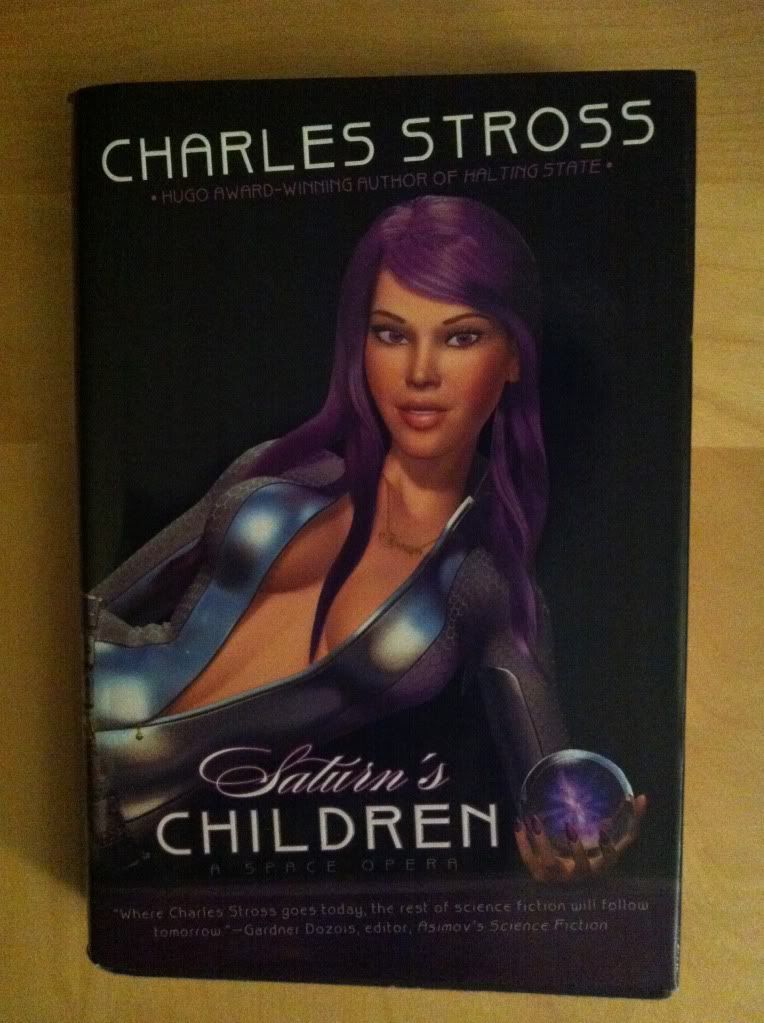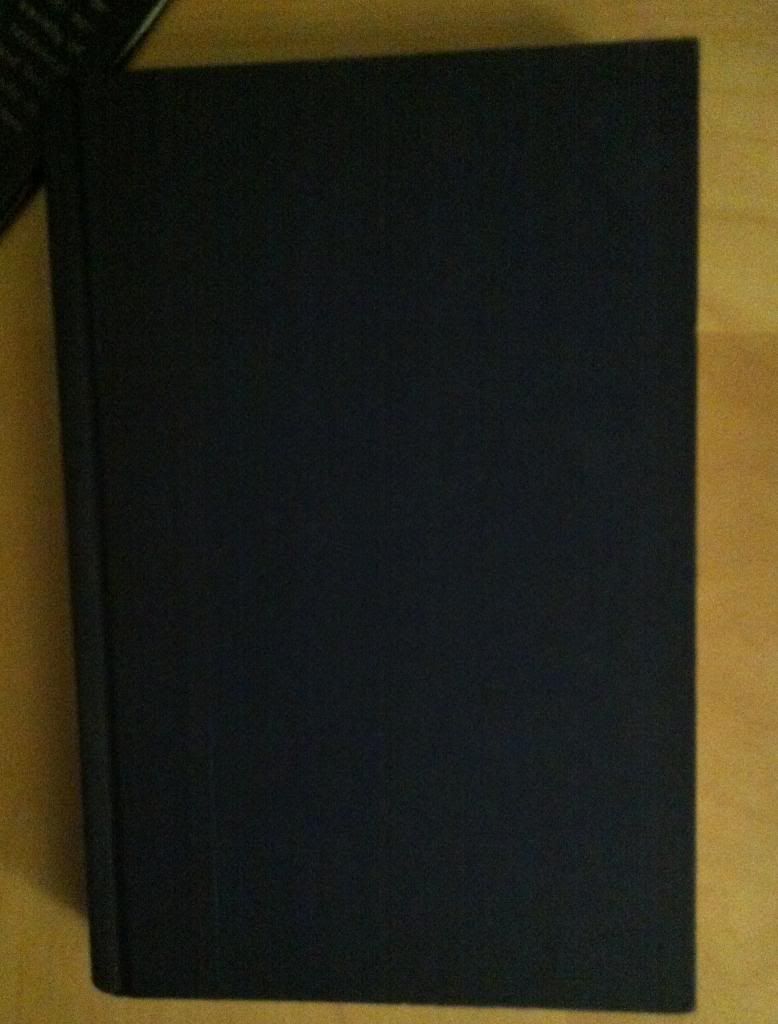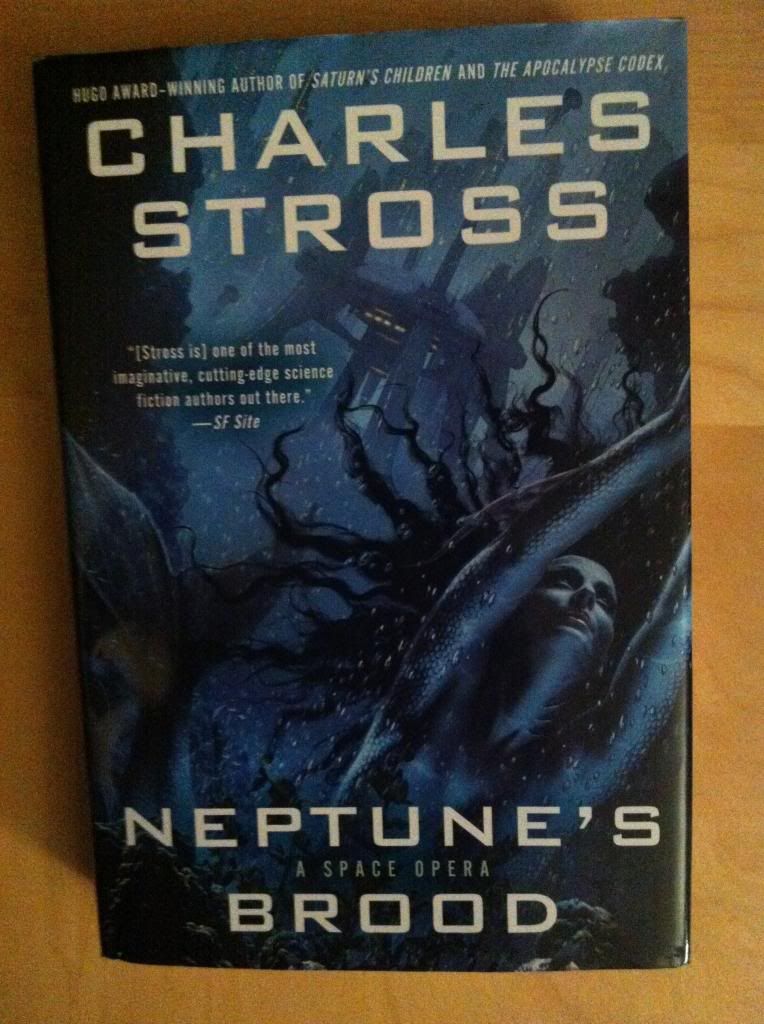One of my favourite aspects of Science Fiction is that, beyond being entertaining stories, it is all about speculation. It is a genre where cracking-smart, imaginative people get to take concepts and technologies and philosophies and create elaborate scenarios to experiment with them. Where we get to enter a discourse about surveillance societies, or anchorable wormholes, or immortality, or styles of government, or robotic servants and see how an author thinks they will affect our lives. I mean, good Science Fiction is still entertaining, but many of the best examples are also interesting and informative.
Saturn's Children and Neptune's Brood are two works of thought experiment Science Fiction.
Saturn's Children: Is a novel about a Sex Robot...
No wait! It's really good and mature and not what you think!
Let's start over...
(That's much better, isn't it? First time I was grateful for the removableness of a dust cover...)
Saturn's Children: is a novel about a Sex Robot and she, Freya Nakamichi-47, is the PERFECT protagonist for the novel. Saturn's Children is a thought experiment about the ethics of creating feeling, sentient robotic servants.
The first key idea is that Robots (and really all technology) are designed in relation to human beings, even though our technological artifacts, particularly thinking, feeling ones, may outlive us. Saturn's Children posits a future where humanity is completely extinct but where our technological offspring continue on, limited and damaged by their ingrained, programmed subservience. In some ways, Saturn's Children is a meditation on Asimov's "Laws of Robotics" ((1) A robot may not harm a human (2) or harm itself, and (3) must obey all humans without violating other rules) where there is no human to give the robotics a purpose. And for this Science Fiction speculation a sex robot is absolutely perfect: a robot designed purely for the sexual pleasure of humans, whose sense of contentment and self-worth are tied to pleasing humans, can never fulfill its purpose, never be satisfied in a future without people. (Whereas a mining robot can still happily dig up coal.) And as such, Freya is the perfect vehicle to explore the idea of sentient technology outliving humanity.
(Also, Real Talk: as soon as we have robots that can approximate humans, there will be sex robots. It is an inevitability. We humans are masters at applying the awesome fruits of the future to sexy times.)
The second core idea is to directly address the ethics of manufacturing self aware servants capable of human emotions and then literally enslaving them. Because, if you think about it, creating something in our own image, something that is essentially a human being loaded into different hardware, and conditioning it to be obedient and to desire above all else to be used is incredibly fucked up! It is creating a race- no, a species- of perfect slaves. And that is a really uncomfortable, really complicated idea. And a Sex Robot is perfect for this discussion too given the very real, very complicated, very horrific/problematic history of sexual slavery and humanity. Add to that the equally complicated connection between submission, sexual pleasure, and voluntary slavery and you have an even more complex conceptual framework for this thematic discussion. Again, Freya is a perfect protagonist for the themes of the novel.
Now, this all makes Saturn's Children sound very scholarly and stuffy, which is quite far from the truth. The novel itself is gleeful and mad, almost bouncy fun bootstrapped onto a kernel of mystery/suspense in a Space Opera universe. The plot of Saturn's Children sees Freya run afoul of the aristocratic slave-owning rich while on the floating casino cities of Venus, forcing her to flee for her life. To escape Venus with her freedom and life intact, Freya must accept an offer from the shadowy Jeeves Corporation that launches her on a solar-system trotting mission of intrigue and betrayal. A mission with ramifications for all of artificial post-human kind. It's a really exciting and enjoyable story.
(Incidentally, Saturn's Children is also a tribute to Sci-fi titans Isaac Asimov and Robert A Heinlein. As such, the novel is in many ways an Asimovian high-concept idea told in the style of a late, dirty-old-man era Heinlein novel which features bright young women with problematic and submissive sexual habits. Which is yet another reason Freya is a perfect protagonist.)
As much as Neptune's Brood is another Science Fiction adventure, it is also a treatise about the nature of money, the tendencies of banking institutions, and the loop-hole ridden, relentless momentum of financial systems. It uses the same general setting as Saturn's Children, (although involving different characters, at a much later date, and with an artificial humanity more removed from their subservient roots) to create an economic system for interstellar commerce. Both Saturn's Children and Neptune's Brood are works of "mundane" Science Fiction, which behave within a universe where the rules of physics and biology more or less apply. Thus the interstellar colonies of Humanity 2.0 are far flung and remote and largely cut off from one another separated, as they are, by the vastnesses of space. Travellers and financial transactions sent between colonies not only undertake trips of prodigious distances but also trips of extreme duration. As such, Post-Humanity requires a financial system that is capable of both immediate value exchanges but also currencies stable enough to maintain their value for the centuries needed for interstellar commerce. And by exploring this financial system, Neptune's Brood, provides a lot of information on what financial systems are, what currency is, and how economics works in a palatable, exciting package.
Also, mermaids.
The plot of Neptune's Brood follows mendicant scholar Krina Alizond-114 as she travels, on behalf of her maternal bank, to study with her sister Ana in a distant solar system. However, upon finally arriving in system, Krina finds out that Ana has skipped town and travelled, perhaps fled, to the water planet of Shin-Tethys. And so Krina must track down her wayward sister to continue her academic pilgrimage and maybe bail her sibling out of trouble. But also, Krina must find Ana for a secret reason, as the sisters, in studying the greatest financial scam perpetrated in modern history, have each come into possession of one half the Atlantis Carnet, a lost currency instrument of ludicrous value with dire political ramifications. To unite this instrument and unlock its treasure, Krina must find her sister and contend with a murderous doppleganger assassin, a mad church, an insurance-underwriting band of pirates, a mermaid monarch, communist squids, and her own nefarious mother. Neptune's Brood asks if Krina can survive solving the greatest fraud in history and become fabulously wealthy in doing so.
I would recommend both Saturn's Children and Neptune's Brood. They are smart, very high concept novels that are also cracking good fun. They have all of the gleeful madness of the best Charles Stross novels with the eyebrow shrugging and winking that a Space Opera (with its inherent goofiness) deserves. Any fan of Charles Stross' books will certainly enjoy these. If you are unfamiliar with Stross, these might be good novels to jump on with: while not as literarily/technically amazing as Accelerando and Glasshouse, they are maybe lighter and more accessible. Both novels stand more-or-less alone, so you can try either Saturn's Children or Neptune's Brood first (depending, I guess, if you prefer Sex Robots or Mermaids).
If you'd like to give the setting a shot, Bit Rot, a stand alone short story set in the same universe with a similar tone, is available for free here. And as always, you can read Accelerando in its entirety for free here.
Previously:
Accelerando and Glasshouse
Halting State and Rule 34
The Laundry Novels (1-4)
The Merchant Princes Novels (1-6)
The Rapture of The Nerds



No comments:
Post a Comment